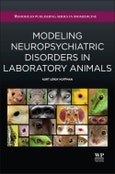The text focuses on the rationale and theory of using animal behavior, both pathological and normal, as a tool for understanding the neural underpinnings of neuropsychiatric disorders. Chapters contain discussions on both classical and modern views on the validation of animal models for neuropsychiatric disorders, also discussing the utility of endophenotypes in modeling neuropsychiatric disease.
Subsequent chapters deal with four specific classes of disorders, including anxiety disorders, depressive disorders, obsessive-compulsive and related disorders. Final sections discuss the future for the development, validation, and use of animal models in basic and preclinical research.
Please Note: This is an On Demand product, delivery may take up to 11 working days after payment has been received.
Table of Contents
- Chapter 1: What is an animal model, and how is it validated?
- Chapter 2: Depressive Disorders
- Chapter 3: Anxiety Disorders
- Chapter 4: Obsessive-compulsive and related disorders
- Chapter 5: Synthesis and Future Directions








